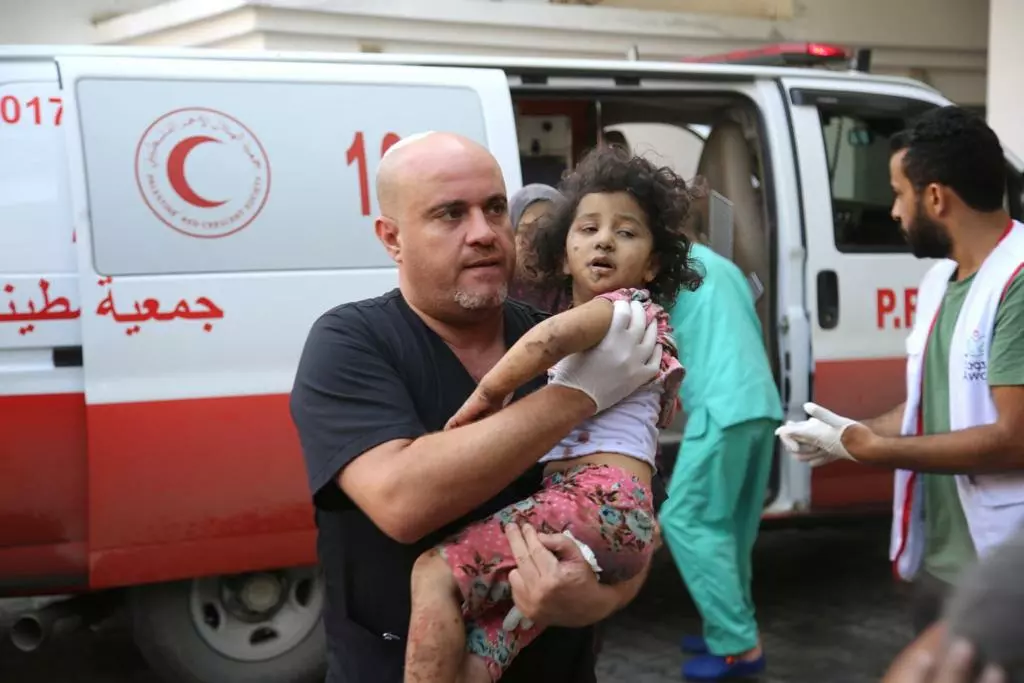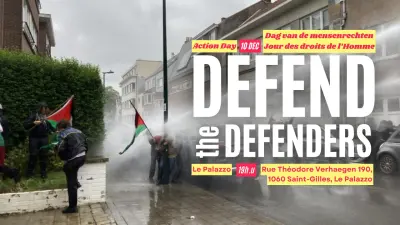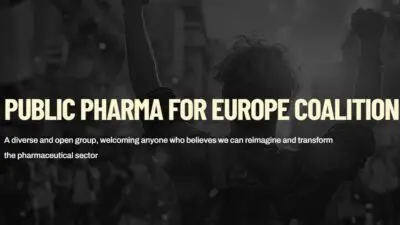Gaza: ‘This is a war on healthcare, not terrorism’.
30,000 dead, including 25,000 women and children. At the end of February, at the time of writing, this is the assessment given by… the White House of the massacres carried out by the Israeli army in Palestine since 8 October. We met Mohammed Salha, the director of a hospital in the Gaza Strip, to put into words the daily horror experienced by millions of Palestinians.
This interview was conducted on 23 February by Fanny Polet, director of Viva Salud in collaboration with Solidair and appeared in the Spring 2024 edition.
Mohammed Salha is the acting director of the AWDA hospital (see box below) in Jabalia, in the north of the Gaza Strip. Why ‘acting’? Because, like many other health professionals, the director, Dr Ahmed Muhanna, was arrested by the Israeli army for no reason on 17 December. Here we meet a father who, despite the horror, remains hopeful.
“I first became aware of AWDA at the age of 13 when I attended the Jabalia community centre. At 18, I became a youth group leader; at 26, I became a volunteer and then a project coordinator. I worked for emergency services for a few years and now I’m one of the people in charge“, begins Mohammed Salha from the Gaza Strip, where he stays to help those in need.
What happened at AWDA hospitals and health centres on 7 October?
Mohammed Salha. On that day, the third scenario of AWDA’s contingency plan was activated. That plan assumes that Israel invades Gaza to destroy it. Medical personnel would then have to go to work at the nearest hospital or centre. Since I live in the north, I went to the hospital in Jabalia.
Our two hospitals are still operational, but of AWDA’s six health centres, four are no longer working. Besides healthcare, the centres also provide services in the shelters nearby, especially psychosocial services for our completely traumatised population.
Were the staff warned by the Israeli army about the bombings?
Mohammed Salha. On 13 October, the Israeli army asked Dr Ahmad to evacuate the hospital. We were running at full speed, especially for pregnant women. We could not leave them behind, we are a hospital! Internally, we decided to stay on post.
On 21 November, the third and fourth floors were bombed. Four people were killed: two doctors working for Médecins Sans Frontières (MSF), one doctor from AWDA and someone accompanying a patient. After that, we were bombed twice more. On 29 January, half the beds were destroyed and on 31 January they targeted our upper floor, where the water supply and solar system are located.
The hospital was besieged by Israeli soldiers in early December.
Mohammed Salha. The hospital was surrounded by tanks and snipers. They were less than 50 metres from us. The siege lasted for 18 days. It was really terrible. The army bombed our water tanks. We ate one rice meal a day. There were 260 of us: staff, patients and three neighbouring families. We could not move upright, as we risked being shot. We had to crawl under the windows. We had to perform three amputations because of bacterial infection. Our pharmacy, forty metres away, was too far away. We had no food.
The hospital was surrounded by tanks and snipers, the army bombed our water tanks
On 17 December, the Israeli army raided the hospital. They took 20 people for questioning, including Dr Ahmad. The next morning around ten o’clock, the soldiers returned with the 20 people. People aged between 15 and 65 had to undress down to their underwear. They tied their hands behind their backs and so left them out in the cold all day, interrogating one after another. At the end of the day, they told 12 people on staff to eat something, change clothes and follow them. Dr Ahmad was one of them. He came to me and said he had been arrested.
The only news we have received since then is from the eight people who have since been released. The Red Crescent (the Islamic equivalent of the Red Cross, n.v.d.r.) has no news. The AWDA management is working intensively on their release, but we know nothing.
The Israeli army claims there are tunnels under the hospitals or that Hamas is using patients as human shields. What do they say about AWDA?
Mohammed Salha. Israel tells everyone that Hamas is hiding in the hospitals. When they questioned me, on the day they arrested my colleagues, the soldiers mainly wanted to know whether we had admitted people who were not patients. That is not the case. We mainly provide services for pregnant women.
My colleagues were arrested because they are important members of the team: the director, surgeons and the ambulance driver. They want the hospital to stop working. This is a war on healthcare, not terrorism. More than 120 health facilities were destroyed and 55 primary health centres were affected (between October 7 and the end of February, n.v.d.r.).
How did you keep working?
Mohammed Salha. I am in contact with Nuseirat headquarters. We are spread all over Gaza. Nuseirat hospital is the only one in the centre that still offers maternity care. There are about fifty deliveries a day. More than three hundred women use our obstetric services. Women have been killed on their way to our hospitals to give birth.
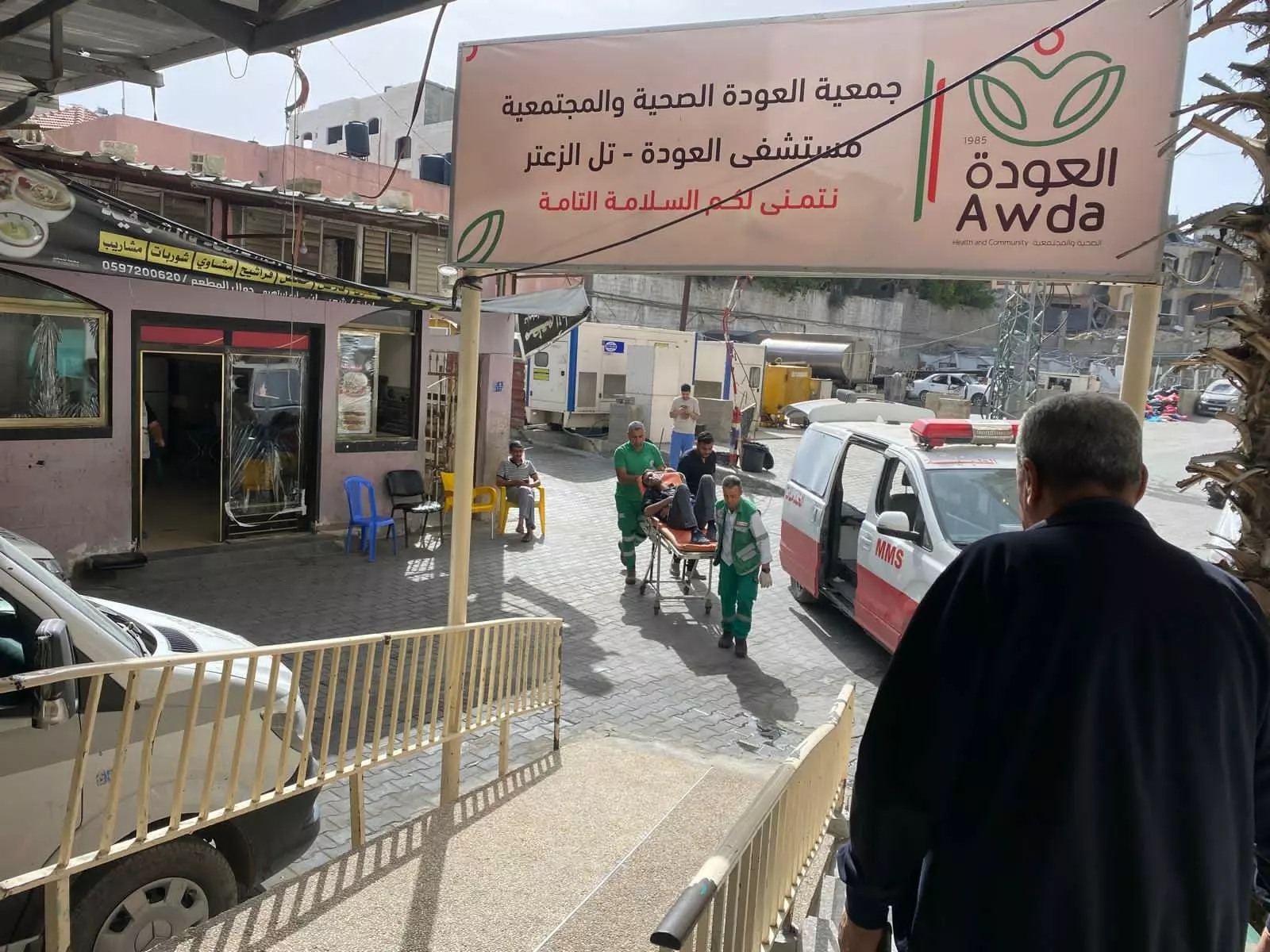

A woman who went to the hospital to give birth was accompanied by her brother-in-law, 16, and her mother-in-law. The mother-in-law was killed on the street in front of the hospital. Coming out after the siege, surrounded by soldiers, the boy saw his mother’s body being lifted by an excavator.
Another woman was shot by a sniper just outside the hospital. We couldn’t possibly help her. I can still hear her screaming. She died of her injuries.
Are you still living with your family?
Mohammed Salha. No. My house was destroyed during the second week of bombing. My family has been in Rafah since 23 November. I have five children, two girls and three boys. My eldest daughter is studying to be an engineer. Not at the moment, as her university was destroyed. The hardest part was in December, when we had three children’s birthdays to celebrate: 15, 13 and 9.
I haven’t seen them for more than three months. I stay informed, at least if communication is not broken. Since AWDA has a centre in Rafah, I can send them money regularly. Food sometimes costs 10 times more than before. We no longer have flour, we eat animal feed.
What does your day look like?
Mohammed Salha. We split the day into two: 12 hours of work and 12 hours of rest. But for the first three months, it was impossible to find rest. We slept on chairs or on the ground for two or three hours. Every day, many wounded people came in. We managed to care for 44,000 since 7 October.
After the siege in December, there were fewer wounded. Our rest periods then became real rest periods.
How do you see AWDA’s work after the war?
Mohammed Salha. We have to think about many things. First, we will have to rebuild. We especially need places where we can help the people. People will come back to our community centres and will need a lot. Maternity care in Gaza has also been destroyed and we need to provide mental health care to the whole population. People are living in shelters, especially in the north, where everything has been destroyed.
We need to think about our community activities and work with other partners. We need to protect the children, young people will also be a key target group. They are getting desperate. They need to feel that they are important to their country, otherwise they will leave. A lot of young people are thinking of leaving Gaza.
What would you love to see happen in Gaza?
Mohammed Salha. I would already like Gaza to look like it did before 7 October. This is an economic, social and psychosocial disaster. There are children without families, families separated, people without homes. We have to give nappies to children aged 3 or 4, even women, that’s how scared they are.
The soldiers destroyed universities, hospitals, schools, streets, water and electricity supplies. Before 7 October, you already could not live normally in Gaza, now it is completely impossible.
How do you see the future?
Mohammed Salha. More than 25 years ago, I started studying the concepts of humanity, human rights and peacebuilding and became an activist. These concepts completely changed my outlook on people. I was very proud of my knowledge and the way I behaved. But during the war, strange feelings started creeping up on me, feelings I never thought I would have. At first I tried to push them away, but I feel so much pain in my heart, from the destruction, the hunger, the killing, from being separated from my loved ones. As a result, I see those who caused this in an extremely negative light, especially when they attack children.
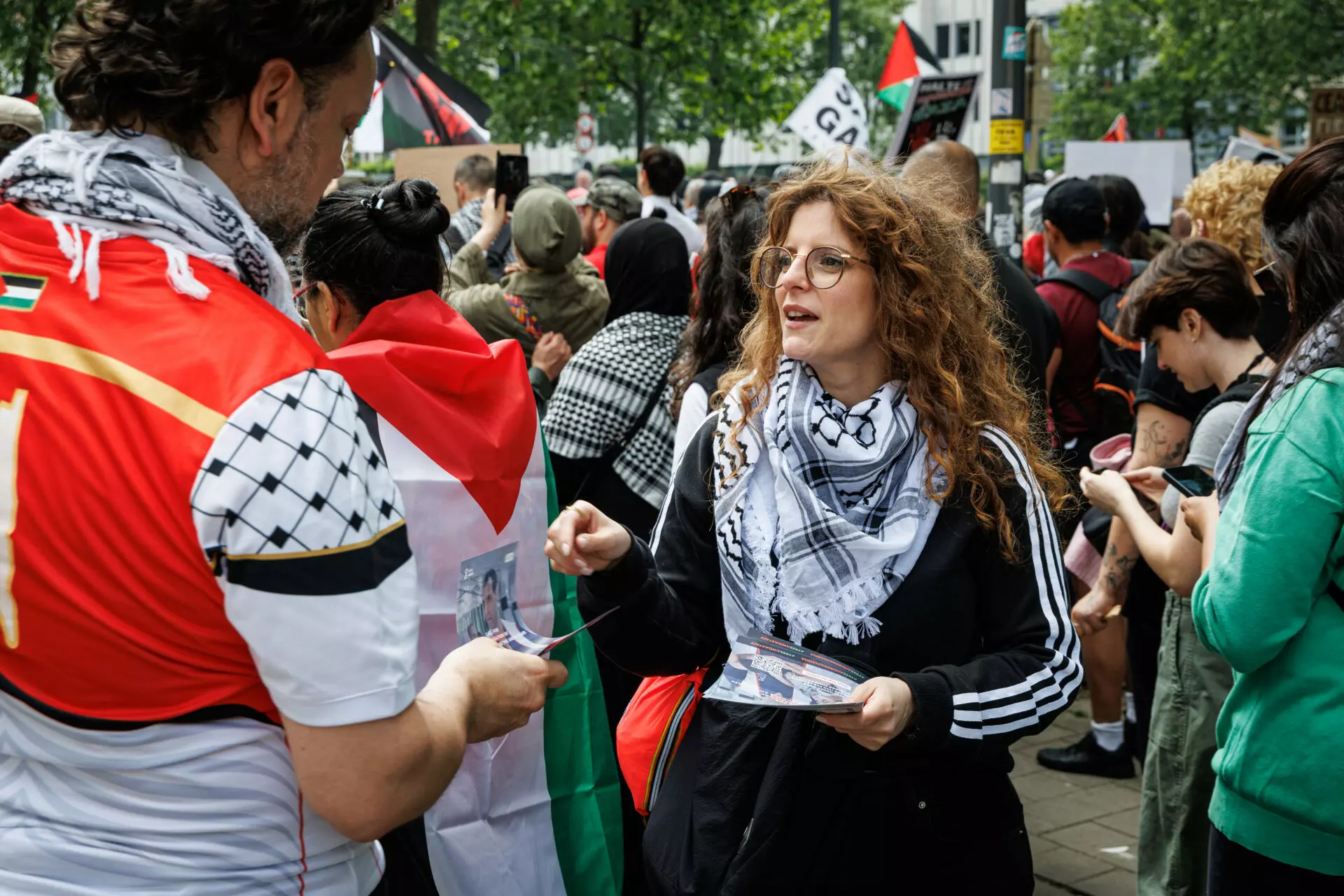
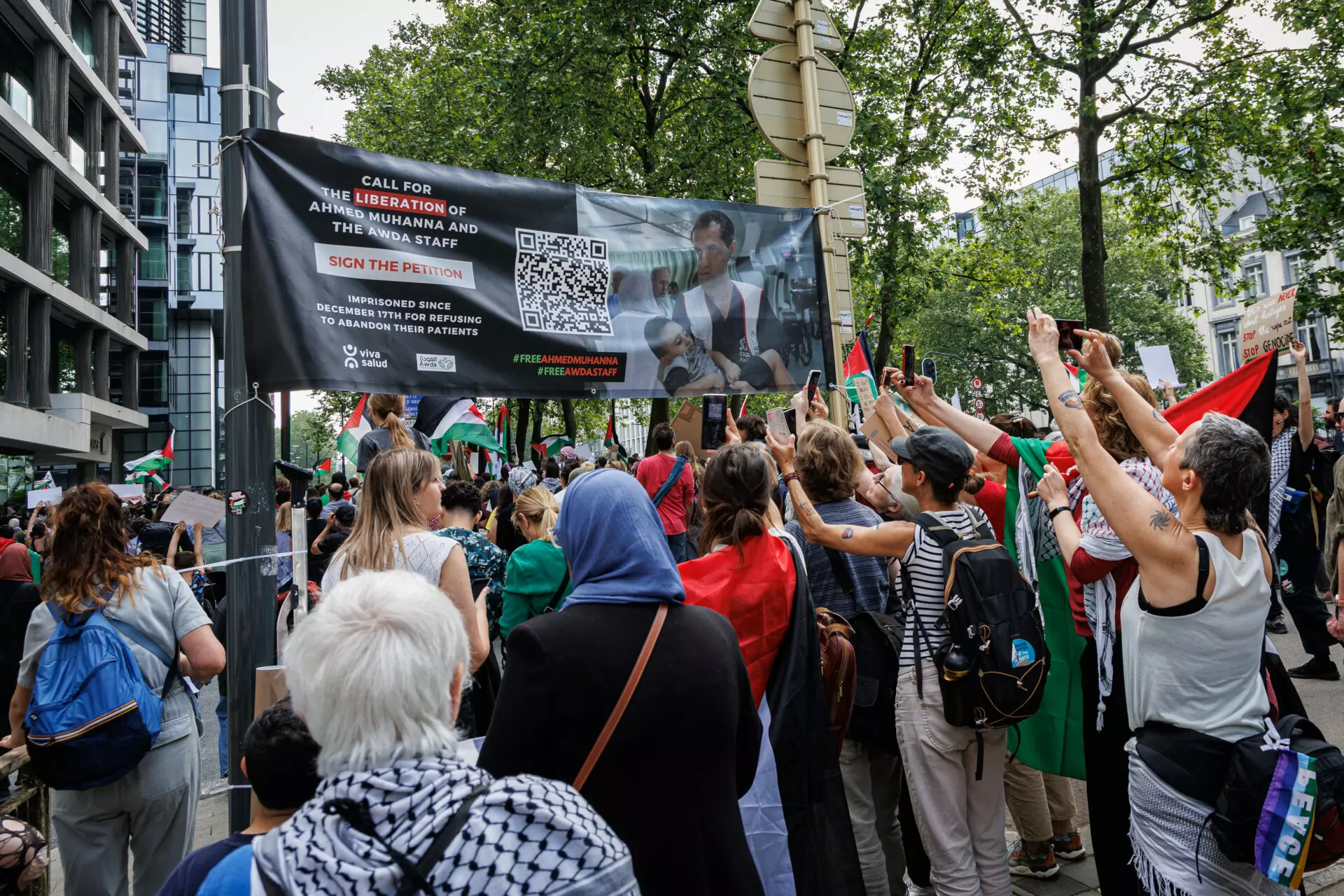
What is upon us is simply inhuman. Israel has destroyed everything. How can you talk about human rights to people who have lost their families? My brother-in-law’s entire family died in the bombings. His parents, his siblings, his siblings’ children. They were normal people like you and me, not terrorists.
Is your sister still alive?
Mohammed Salha. No. Her body is still under the rubble. We can’t even bury her. My cousin is the only survivor. How can I talk to him about human rights? What will he say?
Is there any room for hope?
Mohammed Salha. Despite everything, there is always room for hope. There has to be. We can cope with this situation. We need even more resilience and cooperation. We need to be strong and stay here. Everyone here has lost a brother, a sister, a son, a daughter, a father, a mother, a friend. But we keep repeating that there is hope in our hearts. It is not about the number of lives we have lost, but the number of lives we have saved.
My colleagues have not seen their families for 140 days. We are angry, we are hungry. We got up at half past three to do the briefing together. Seeing the desperation in their eyes, I suggested singing. So after the briefing, we sang together until I felt they were motivated again. We will remain human till our last breath. And when we die, we will do so with dignity and in peace.
| Solidaire is the magazine of the Belgian Labour Party (PTB-PVDA). The magazine takes a different look at current affairs, presenting a mix of interviews and analysis on topical national and domestic issues such as health, education, the environment, housing policy and trade union news. |
| AWDA is a Gazan health organisation with 2 hospitals and 6 community health centres throughout the Gaza Strip. As well as providing healthcare, its community health centres offer training and a meeting place for young people. Since 7 October, AWDA has been providing other services according to the needs of the population: distribution of food parcels, mattresses and blankets for displaced persons, and activity kits for traumatised children. AWDA has lost 7 members of staff since 7 October, and 6 are in prison without knowing what they are accused of or their sentences. The staff are continuing their work, however, as women continue to give birth and the wounded continue to pour in. |
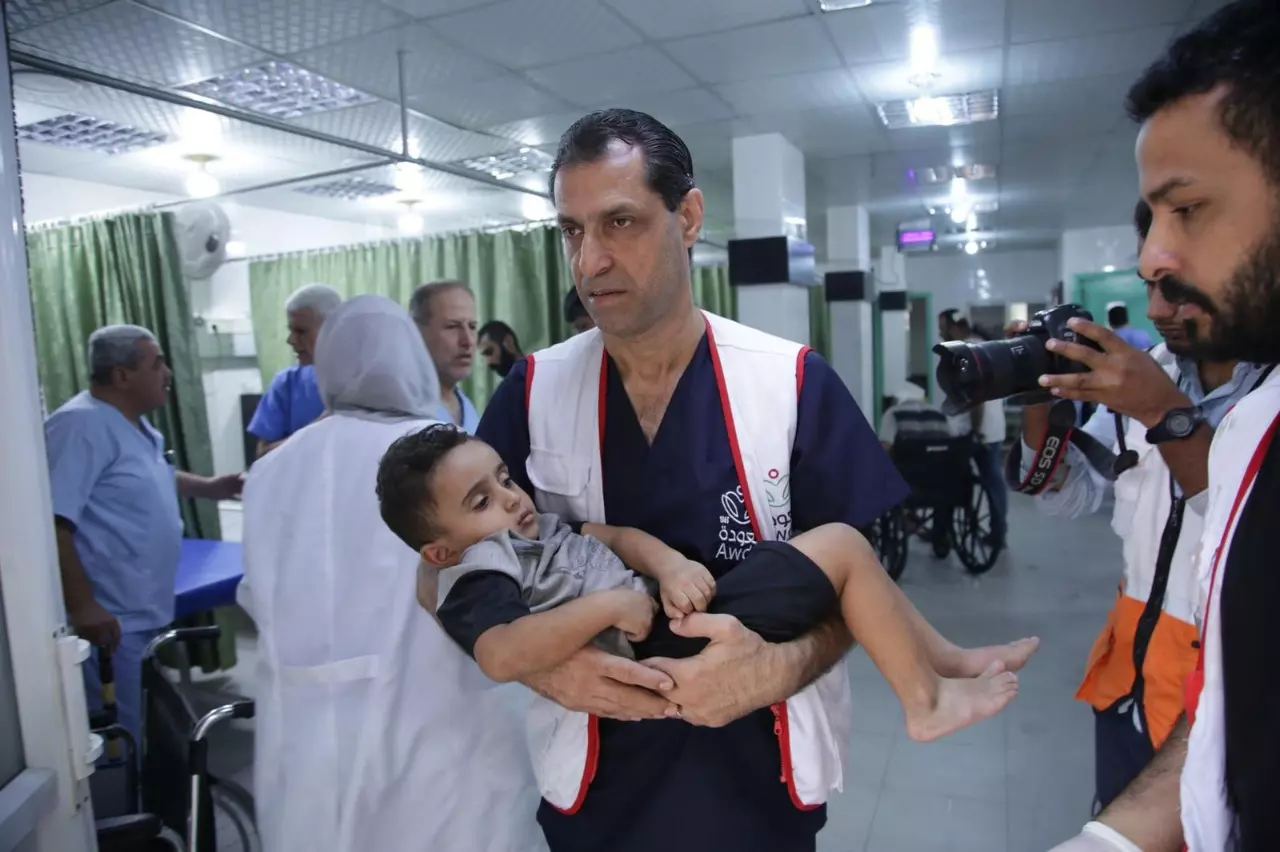
Viva Salud supports AWDA and calls for the immediate release of AWDA staff and its director Dr Ahmed Muhanna. We call for the unconditional protection of all health workers⸱euses in Gaza. Health professionals⸱le⸱s are not a military target.
▶︎ SIGN THE PETITION
